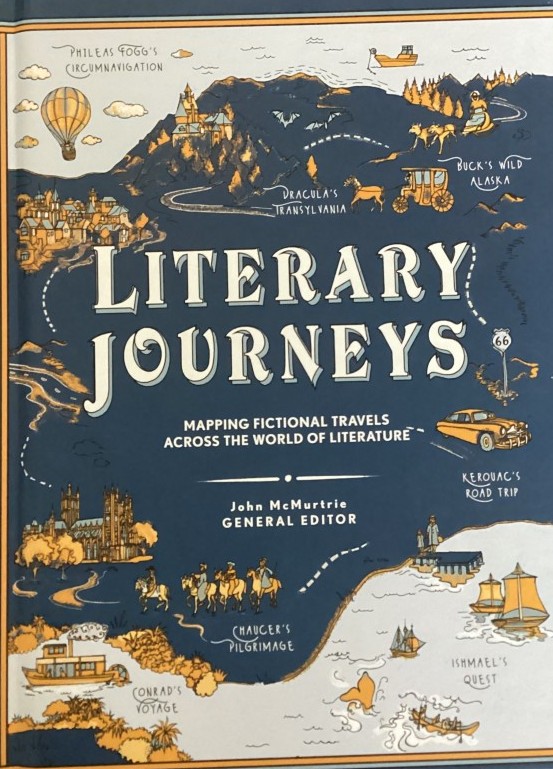Inspiring Older Readers
 posted on 17 Sep 2024
posted on 17 Sep 2024
Literary Journeys: Mapping fictional travels across the world of literature, edited by John McMurtrie
If you are a fan of literary fiction, here’s a book that is going to be on the table next to your favourite reading-chair or sitting temptingly on your bedside table within easy reach. Why? Because general editor, John McMurtrie has curated a collection of superbly economical essays – nothing more than a two or three pages long – from some notable writers, critics and academics that explore the theme of travel in literary fiction and do it in such a way that makes the book an ideal one to dip into without having to commit to any extended analysis or focus on a single example that may outstay its welcome. And, as if to add a dose of delicious syrup on top of an already tasty plate of goodies, it’s packed with a fabulous array of subject appropriate artworks from all sorts of sources that illustrate virtually every page.
The books included here are organised in a sort of chronological order but also grouped under four key headings – ‘Quests & Explorations’, ‘The Age of Travel’, ‘Postmodern Movements’ and ‘Contemporary Crossings’. You probably won’t be reading this book from first page to last or in any systematic way and so this kind of grouping of books in broad chronological themes will help you decided what sort of mood you’re in and where to dive in.
I think it’s worth emphasising a couple of things about the notion of literary journeys at this point. Firstly, there are plenty of examples here that won’t come as any surprise to you because they signal the peripatetic nature of their subject matter right up front – Around the World in Eighty Days is a good example of that. But secondly, the physical journey can also be a metaphor for the personal or spiritual journey of self- discovery – or even psychological investigation (Heart of Darkness). Both of these are well catered for.
British and U.S. writers are well represented here and probably make up a majority proportion of the selections but I was delighted to see that literature from around the globe does get a healthy look-in. I was especially pleased to discover a range of works from authors that I am personally unaware of – especially in the ‘Contemporary Crossings’ section - so reading this was literally a voyage of discovery for me. Can I suggest you need to keep a good supply of Post-it stickers at hand to mark the pages of those books you’re going to have to go back and order copies of.
As you might expect, the short essays vary considerably in style and it would be wrong to pick out any of them for special attention because everyone will have their own favourites and, no doubt, everyone will also have ones that disappoint or infuriate them – such is the nature of this kind of anthology. But what I can say is that none of the authors have been too narrow in their contribution and while the theme of ‘journeys’ dominates, most books get a wider consideration and contextualisation.
I’d I also like to put in a word for the design and production of the book – which is a delight to look at and handle. My only criticism is that I’d have liked the name of the person who wrote each essay shown at the beginning or end of their contribution: you have to turn to the back credits where the contributors are listed alphabetically and scan through them to track down the piece you’ve just read. That all feels a bit clumsy.
But this is a small criticism for a book that will give lots of pleasure. Available now from Princeton University Press, you will be able to get a copy from your local independent bookshop – who will be glad to order it for you if they don’t have it on their shelves.
Terry Potter
September 2024